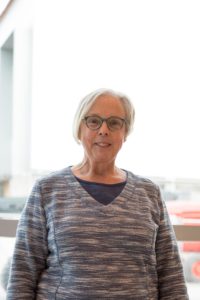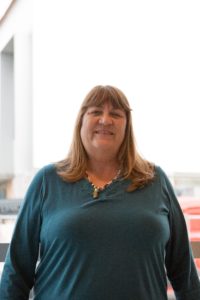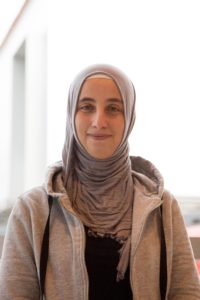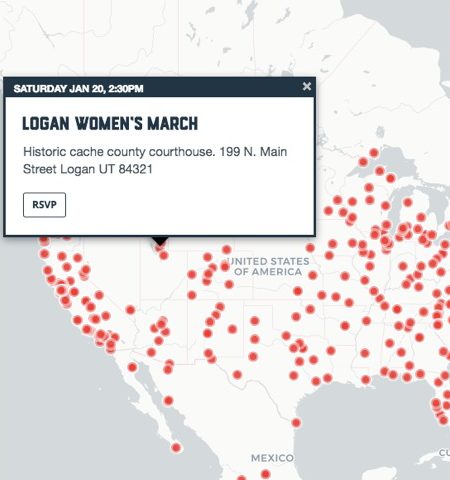USU faculty and students to speak at the Logan Women’s March
Last year, millions of people flooded the streets of cities across the world to protest the inauguration of President Donald Trump, calling it the Women’s March. This year, to mark the anniversary of the historic event, hundreds of cities worldwide are holding marches – including Logan.
The demonstration will be held on Saturday Jan. 20 at 2:30 p.m. in front of the Historic Cache County Courthouse at 199 N. Main St.
Hundreds of Women’s Marches are being held all over the world this weekend from Utah to Uganda, according to the Women’s March official website.
Logan held its own spontaneous march for women’s rights last year, with attendance of around 50 people. This year’s march was formally registered with the Women’s March organization and the event was locally organized by Susan Jelus, an activist from Newton.
“I am involved, personally, just because I want to help provide an opportunity for people to get involved and speak up,” Jelus said.
 Kyle Todecheene)
Kyle Todecheene) Susan Jelus, the founder of the Facebook group “Stand Together” and the organizer for the Logan Women’s March, set to advocate for the the rights of women.
Colleen O’Neill, an associate professor of history for Utah State University, will be speaking at the event on the importance and power of organizing.
“We haven’t forgotten,” O’Neill said. “We’re keeping up the momentum.”
O’Neill, both a historian and an activist, said that unifying together is what helps transform personal problems into shared problems into shared solutions. Connecting with people who have experienced what you’ve experienced is what the demonstrations are all about, she said.
“It makes you feel less powerless and helpless,” O’Neill said. “It makes you feel like you can do something as a group.”
Iris Nielsen, a volunteer for the Logan march, said that it’s important for people from surrounding areas, such as Wyoming and Idaho, to feel included – especially if no closer demonstrations are being held.
“You’re welcome to join us,” Nielsen said.
 Kyle Todecheene
Kyle Todecheene Iris Nielsen, volunteer for the Logan Women’s March that is going to be set to protest on January 20. (Kyle Todecheene)
There are seven scheduled speakers for the event:
-Jenny Wilson, candidate for US Senate.
-Colleen O’Neill, Associate Professor of History, speaking on the power of organizing.
-Karina Hernandez, USU Multicultural Sorority President.
-Christy Glass, professor of sociology and organizer of Real Women Run, speaking on the power of women in leadership.
-Star Coulbrooke, Logan Poet Laureate.
-Gonca Feyza Soyer, a Muslim woman living in America.
-Vikki Salinas, therapist for the CAPSA domestic violence, abuse and rape recovery center, speaking on the #Metoo movement.
-Nahomi Jimenez, an international student and leader of USU-Inclusion.
“People are excited about it,” Jelus said. There are 75 people officially RSVP’d for the event, but Jelus and Nielsen said they hope for hundreds of attendees.
The march is all about empowering women, Jelus said. This was the effect the 2017 Women’s Marches had on Gonca Soyer, a scheduled speaker for the event on Saturday.
Soyer is an adjunct instructor for both the psychology and family, consumer, and human development departments at USU. Unable to physically attend the Women’s March last year, Soyer watched the D.C. march with her then 5-year-old daughter, Azra.
Soyer said that Azra understood that women are underrepresented and that’s why so many women were walking together – to be heard.
“We raise our kids. We are the ones who are shaping their minds and brains, and thinking and their understanding of this world,” Soyer said. “So, I think we matter a lot.”

Gonca Soyer, an adjunct instructor at Utah State University from Turkey, who came to the United States for its freedom and education. (Kyle Todecheene)
Watching the D.C. Women’s March last year gave Soyer the courage to embrace being a self-described black sheep in her community. She said seeing other women in headscarves leading a march inspired her to find the courage to be and express herself.
“It changed how I perceived myself,” Soyer said. “I always felt like I had to blend in.”
Watching the large groups of women stride together in D.C. for equality inspired Soyer to become an activist in her own community for women’s rights, she said.
“It was a wake-up call for me,” Soyer said. “And I believe it was a wakeup call for a lot of women.”
Living as a practicing Muslim woman in America wasn’t what Soyer expected. She said she has been called a terrorist and accused of being dangerous – all because of the way she dressed.
“I didn’t really think I would face these issues when I came here. I was probably too naïve,” she said.
Soyer will be speaking about her experience wearing a headscarf in the United States at the event.
USU students are getting involved with the march as well. Karina Hernandez, a student and multicultural sorority president at USU, said she thinks this is a special event to celebrate women across different races, cultures, religions, backgrounds and lifestyles.
“As women, I don’t think we get many opportunities to celebrate ourselves and each other, so it’s important for me to be there,” Hernandez said.
Hernandez will be speaking at the demonstration on her experience as a Latina, a child of immigrants and a first-generation student.
Another important facet of protests, Jelus said, are the placards used to convey the messages relevant to the movement. To give participants an opportunity to create their own memoranda, there will be a sign-making event prior to the march in the Logan Library Bonneville room at 1 p.m.
— laurenmarie.bennett@aggiemail.usu.edu
@laurmarben
image courtesy of Women’s March website

